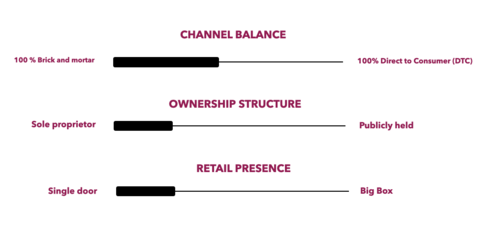How would you describe the difference between REI and your local independent outdoor store?
After honing in a bit on what ‘specialty’ refers to within the retail landscape (LINK), it’s clear that it’s still a super broad idea. Yet if you paint a one-door store in Tahoe and a multi-global big box store with the same ‘specialty’ brush … people will bristle.
So, how do you calmly and equitably differentiate between a specialty store like Dick’s Sporting Goods and a stick-and-puck shop like Kevin Smith Sports? Or between REI and Skinny Skis? One common approach used by business decision makers is to bulk the smaller stores in the equation under the “independent” tag.
OK … SO WHAT IS AN ‘INDEPENDENT SPECIALTY’ RETAILER?
Independent specialty retailers are a varied bunch with a wide range of business approaches and sophistication. Despite some structural differences, independent specialty retailers share many commonalities … they are locally owned, focus primarily on local consumers, hire local employees, and have significant connections to the local economy as well as local/regional destinations or events.
There are three primary considerations in determining an independent specialty retailer, including their sales channels, their ownership structure, and their retail presence. In each area, independent specialty retailers are recongizeable by their strong and direct connection to local communities and economies
CHANNELS
* Independent specialty retailers always have a brick-and-mortar component.
* Independent specialty retailers may have an online component to their business, such as direct to consumer sales, buy-online-pickup-in-stores (BOPIS) or other tactics. If they do have an online business component, it is a minority of their overall sales.
* The anchor of their brick-and-mortar environment influences both how they engage with consumers as well as how they buy products from suppliers. They are “analog sellers as well as analog buyers,” who prioritize personal product testing and hands on experiences throughout the sales process.
OWNERSHIP
* Independent specialty retailers range from owner-run sole proprietorships to larger corporate ownership structures in which the owners are still connected to the business and the local community.
PRESENCE
* Independent specialty retailers range in size from single location operations to multi-door businesses within an identifiable geographic region.
* Independent specialty retailers have community presence and a connection to the local economy. This connection is influential and visible in their operations. Even multi-door independent specialty retailers operate with a single store mentality.
(** Once again, these are emerging working definitions, and I am definitely looking for feedback. Please feel free to comment on this post, or send me a direct note at pr@palemorning.com. Thanks)

